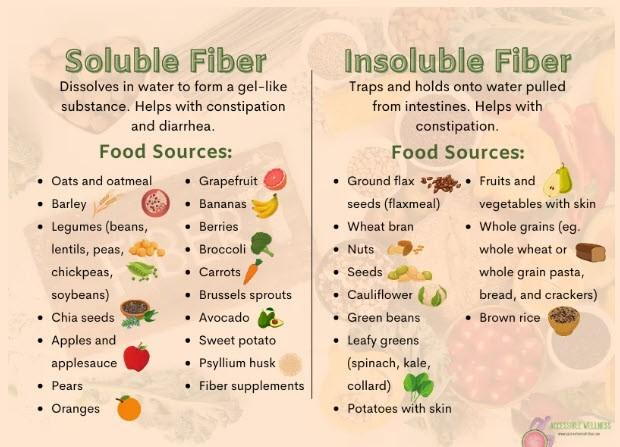Ronald Grisanti D.C., D.A.B.C.O., DACBN, MS, CFMP
Fiber is an essential part of a healthy diet.
This article will provide a good overview on the fundamentals of eating fiber.
Fiber is a type of carbohydrate that the body can't digest. Though most carbohydrates are broken down into sugar molecules called glucose, fiber cannot be broken down into sugar molecules, and instead it passes through the body undigested.
There are two main types of dietary fiber: soluble and insoluble. Both are important for health, digestion, and preventing diseases.
Soluble Fiber
Soluble fiber attracts water and turns to gel during digestion. This slows digestion.
What foods have soluble fiber?
Soluble fiber can be found in many common foods, including:
- Oats
- Barley
- Apples
- Citrus fruits
- Carrots
- Beans and legumes
- Brussels sprouts
- Sweet potatoes
Insoluble Fiber
Insoluble fiber traps and holds onto water pulled from the intestines. It adds bulk to the stool and appears to help food pass more quickly through the stomach and intestines.
What foods have insoluble fiber?
Foods rich in insoluble fiber include:
- Whole wheat
- Brown rice
- Nuts and seeds
- Cauliflower
- Green beans
- Zucchini
- Dark leafy greens
- Peppers

You Need a Combination of Soluble and Insoluble Fiber
Soluble fiber is excellent for supporting cardiovascular health, while insoluble fiber supports healthy digestion and regularity.
A balanced diet that includes a variety of fruits, vegetables, whole grains and legumes will help you meet your fiber needs and reap the benefits of both types.
What is the Optimal Amount of Soluble and Insoluble Fiber One Should Have Per Day?
The recommended daily intake of fiber is 25–30 grams (or up to 38 grams), with a good balance between soluble and insoluble fiber.
Many health experts recommend aiming for about a 1:3 ratio of soluble to insoluble fiber.
This can be achieved by eating a variety of fiber-rich foods.
Fiber is important for a healthy diet because it has many health benefits, including:
Heart Disease and Fiber
Dietary fiber can help prevent heart disease in a number of ways, including:
Lowering cholesterol
Reducing inflammation
Lowering blood pressure
Reducing the risk of stroke and type 2 diabetes
Diabetes and Fiber
Dietary fiber can help prevent diabetes in a number of ways, including:
Research has consistently shown that, for people with type 2 diabetes, eating more fiber can help improve blood glucose control. The human body is unable to absorb and break down fiber. Because of this, fiber does not cause a spike in blood glucose the way other carbohydrates can.
Cancer and Fiber
Fiber can help prevent cancer in a number of ways, including:
- Fiber binds to carcinogens and helps to expel them from the body through stool.
- Fiber is converted into short-chain fatty acids by bacteria in the colon, which can reduce the ability of cells in the intestine to become cancerous.
- Fiber helps to increase the size and frequency of bowel movements, which can dilute the contents and reduce the time harmful chemicals spend in the bowel.
- Fiber can help you maintain a healthy weight, which can reduce the risk of many cancers.
- Fiber can bind bile acids, which can reduce cholesterol levels and decrease the risk of colorectal cancer growth.
- Fiber can change estrogen production, which may lower the risk of breast cancer
Autoimmune Disease and Fiber
Fiber can help prevent autoimmune disease by:
- Limiting autoimmune neuroinflammation
- Dietary fiber can limit autoimmune neuroinflammation by restricting the activation, polarization, and migration of Th1.
- Enriching good bacteria
- Resistant starch can enrich good bacteria in the gut, which can help suppress the growth of bacteria that trigger autoimmune disease.
- Increasing anti-inflammatory immune cells
- Inulin, a type of fiber found in fruits and vegetables like bananas, asparagus, and garlic, can increase the number of regulatory T (Treg) cells, which are anti-inflammatory immune cells.
Intestinal Disorders and Fiber
Fiber can help prevent intestinal disorders by:
- Softening stool and preventing constipation: Fiber adds bulk and helps stool move through the intestines more easily.
- Reducing pressure in the colon: Fiber can help prevent flare-ups of diverticulitis.
- Regulating stool frequency and consistency: Soluble fiber can help with this in people with irritable bowel syndrome (IBS).
- Providing a substrate for beneficial bacteria: Fiber feeds the good bacteria in your gut.
Weight Loss and Fiber
Fiber can help with weight loss in a number of ways, including:
- Feeling full
- Fiber-rich foods can help you feel full longer, which can help you eat less and maintain a healthy weight.
- Fiber slows down the speed at which food moves through your stomach and gut.
- Soluble fiber absorbs water and slows the absorption of sugars into your bloodstream, which can help your body avoid storing fat.
- Fiber feeds good gut bacteria, which can help with weight management
Dr. Grisanti's Comments:
Strive to obtain 25–30 grams (or up to 38 grams) of fiber per day, with a good balance between soluble and insoluble fiber to improve your health and wellness and decrease the above listed disease risks.
As always, you should consult your healthcare professional prior to beginning any new dietary or lifestyle regimen.
References:
https://www.ncbi.nlm.nih.gov/pmc/articles/PMC11099360/
https://www.ncbi.nlm.nih.gov/pmc/articles/PMC5731843/
https://jamanetwork.com/journals/jamainternalmedicine/fullarticle/216689
https://www.ncbi.nlm.nih.gov/pmc/articles/PMC6566984/
https://www.ncbi.nlm.nih.gov/pmc/articles/PMC10255454/
https://pubmed.ncbi.nlm.nih.gov/1851150/
https://www.ncbi.nlm.nih.gov/pmc/articles/PMC6041322/
https://journals.aai.org/jimmunol/article/208/1_Supplement/60.04/236143/A-dietary-fiber-limits-autoimmune
https://www.ncbi.nlm.nih.gov/pmc/articles/PMC2153876/
https://www.ncbi.nlm.nih.gov/pmc/articles/PMC10150096/
The information on this website is not intended to replace a one-on-one relationship with a qualified health care professional and is not intended as medical advice. It is intended as a sharing of knowledge and information from the research and experience of Dr. Grisanti and his functional medicine community. Dr. Grisanti encourages you to make your own health care decisions based upon your research and in partnership with a qualified health care professional.
